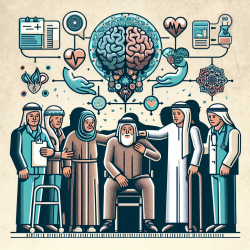Introduction
In the realm of mental health, understanding the dynamics of social support and psychological distress is crucial, especially among vulnerable populations like the elderly. A recent study titled "Social Support and Psychological Distress among the Bedouin Arab Elderly in Israel: The Moderating Role of Gender" sheds light on these dynamics within the Bedouin Arab community in Israel. This blog aims to provide practitioners with insights to enhance their skills and encourage further research in this area.
Key Findings from the Study
The study explored the levels of psychological distress and social support among Bedouin Arab elders, with a focus on gender differences. Key findings include:
- Gender Differences: Female elders reported higher levels of psychological distress and lower levels of instrumental support compared to their male counterparts.
- Social Support's Role: Among women, lower levels of perceived and instrumental support were associated with higher psychological distress.
- Instrumental Support: Men reported higher levels of instrumental support, which was associated with lower psychological distress.
Implications for Practitioners
Practitioners working with elderly populations, especially those from ethnic minorities, can draw valuable insights from this study:
- Focus on Gender-Specific Interventions: Understanding that women may experience higher psychological distress due to lower social support can guide the development of targeted interventions.
- Enhancing Social Networks: Facilitating the creation of strong social networks for elderly women can be a protective factor against psychological distress.
- Instrumental Support: Encouraging family and community involvement in providing instrumental support can significantly reduce psychological distress among elders.
Encouraging Further Research
While this study provides significant insights, it also highlights areas for further research:
- Broader Demographic Studies: Expanding research to include a more diverse demographic can provide a comprehensive understanding of the issues faced by elderly populations globally.
- Longitudinal Studies: Long-term studies can help in understanding the evolving nature of social support and psychological distress over time.
- Cross-Cultural Comparisons: Comparing the findings with other cultural contexts can offer a broader perspective on the role of social support in mental health.
Conclusion
The study underscores the importance of social support in mitigating psychological distress among elderly populations, particularly women. Practitioners are encouraged to integrate these insights into their practice to enhance the mental well-being of their clients.
To read the original research paper, please follow this link: Social Support and Psychological Distress among the Bedouin Arab Elderly in Israel: The Moderating Role of Gender.










